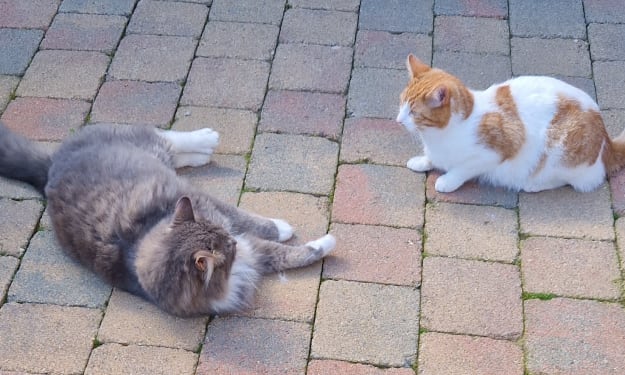Top Ferret Care Tips
Welcoming a new furry member to your family? Check out these tips from a ferret owner!

So, you’ve just considered adding a new furry member to your home. You could choose a dog, cat, or hamster, but one of the most rewarding and fun pets are... ferrets!
Many think that they are hard to care for, and without proper research the energetic personalities of these little guys can overwhelm a new animal owner. But, I have owned gerbils, dogs, cats, hamsters, turtles, bearded dragons, birds, and even rabbits—and I have found that ferrets are actually very easy to care for! They usually use a litter box (so clean up isn’t overwhelming) and they tend to sleep a LOT. They are also some of the funniest, most interesting animals you may ever meet. They are always full of surprises!
So, without further ado, lets dive right in to my top tips for your first ferret!
1. Housing
Ferrets are extremely active, and curious. The worst thing you can do to a ferret is to lock him/her in a small cage and never let them out. Ferrets need at least an hour of out-of-cage playtime each day. You’ll want to make sure the cage has at least two levels, enough room for separate areas for a litterbox, food and water dishes, a sleeping area, and a play area. Many ferret owners prefer to cover the bottom of the cage with fleece or blankets; this will be very cozy for your ferret! Also make sure that the floors and ramps are NOT made of mesh or wire, but rather a smooth surface such as plastic or metal. Their little toes and claws can get caught in the mesh.
Some of the best ferret cages are multi-level ferret nation cages and feisty ferret cages. Some of the worst are ANY that are meant for a guinea pig or any smaller animal. You’ll want to think of your ferret like a kitten; they need plenty of room.
Your ferret will likely be very curious and easily bored, so make sure they have plenty of toys to play with if you plan on keeping them in the cage for most of the day. They can become extremely bored and take out their restlessness in unproductive ways, such as knocking over their food dishes, tearing up the fleece, and just making a mess of their cage in general. The happiest ferrets are mostly free-roam ferrets who only are constrained to their cages when alone in the house or at night.
2. Diet
One of the biggest mistakes people make with their new ferrets is their food choice. Ferrets are strict carnivores who cannot eat peanut butter, fruits, veggies, chocolate, dairy, grains, or sugar. Dog/cat food can sometimes be okay for a ferret, but you’ll need to make sure the food has honest, wholesome ingredients and does not contain any kind of grains or cornmeal. While those kinds of cheap dog/cat foods may seem okay, it will probably end up killing your furry baby in the long run.
Ferrets have very small intestines, with their digestive track being the width of an uncooked macaroni noodle. That means they will have a very hard time digesting anything other than meat, and may even develop intestinal cancers later in life if fed any of the above foods more than once.
Some of the best foods for your ferret are specially made ferret foods, like Marshall's ferret food. However, these can be very expensive. So, some ferret owners opt for wet kitten food, or even raw meat like chicken breast. Your ferret will love these!
Also, ferrets have tons of energy because of their high-protein diets. They will need access to clean water at all times of the day because they can become dehydrated very quickly.
Overall, a clean diet makes for a happy, healthy, long-living ferret!
3. Temperatures
Ferrets are susceptible to intense temperatures. Too hot or too cold can be dangerous for them. They will enjoy burying themselves in laundry or fabrics (so look out!) but they will be able to tell what is too hot. Never leave their cage too close to an open window in the winter or too close to a heater at any time of the year. If you plan on taking your ferret out for a walk, make sure they have plenty of water during the hotter months, and always pick them up and hold them from time to time if you take them out during snowy times. Ferrets do love snow, though! They will appreciate the adventure.
4. Other Pets
Ferrets are meat eaters and naturally love to burrow and hunt. If you own any other type of small animal or bird, make sure to keep them separate, as your ferret will likely see your other beloved as prey. Not only can this be confusing for your ferret, but it will likely scare the socks off of your other animals, if they are lucky enough to have the ferret not attack them. Ferrets' teeth are sharp, and so are their claws. They can easily pin down and bite any rodent or bird.
5. The Smell
While you will get used to the ferret musk over time, (even with their scent glands removed) its probably a good idea to invest in some spray to lower the stench even more. You can spray the Marshall brand spray directly on your ferret to reduce smell, or even add some to their food and water! Do NOT bathe them more than once a month, as this will confuse the oil production on their skin and will likely cause them to smell even stronger. If the smell is too unpleasant for guests, you might want to always have incense/air freshener on hand. Make sure to clean out their litter box every day, or at least once a week to really reduce the smell.
6. Entertainment and Enrichment
As said before, ferrets are very curious and playful animals. During play time, you'll want to engage with them a lot. This will help with bonding and also make your ferret very happy. If you can’t afford some of the more expensive ferret toys out there, dog toys, homemade toys, and cat toys will do the trick! Some of the most enriching homemade toys are:
- a large bin filled with uncooked rice or packing peanuts that they can dig and burrow in
- any type of tube
- socks (but watch out, your ferret will probably love the smell of your feet, so they may attack your socked foot from time to time!)
- basically anything you can find that could be set up into an obstacle course
- cardboard boxes
- anything that rolls, spins, pops, jumps, crinkles, or makes noise!
Ferrets are little theives, and they will likely steal and stash any item that they find interesting. Make sure to keep your valuables out of their reach, and resrict their access to under your bed or couch, the bathroom, and the kitchen. They may get into appliances which can be dangerous for them, and possibly your wallet, so ferret-proofing your house is a good idea! Hide any wires they can reach, and restrict access to plants, window sills, electrical appliances, and baby’s room (if you have a baby!).
Overall, ferrets are one of the most unique pets you can ever own; they will become your best friend very quick like a dog, make you laugh like a cat, and get into anything — like a monkey! Follow these tips and you will be well on your way to raising a happy, healthy, and enriched ferret friend. Good luck out there, and remember, do not commit yourself to a pet which will be too much to handle, as ferrets can become very attached to their owners and rehoming them can be traumatizing.







Comments
There are no comments for this story
Be the first to respond and start the conversation.